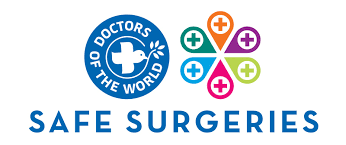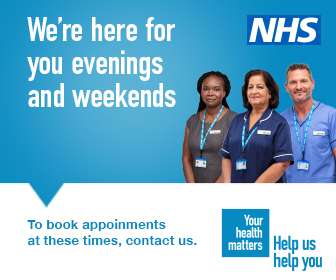Chaperone Policy
You are very welcome to be accompanied by a trusted friend or relative at your consultation if you wish, and this is all the more important if English is not your first language, or if you feel you might not be able to express what you need clearly to the doctor or nurse.
In additon, for intimate examinations, you will be offered the choice of having another professional clinician present at the examination. This is called chaperoning.
Because we are a small practice this might not be possible at all times. If we cant allocate a chaperone when you wish one to be there, then we can reschedule your examination to another time.

1 Introduction
1.1 Policy statement
At Budleigh Salterton Medical Centre, all patients will routinely be offered a chaperone, ideally at the time of booking their appointment. It is a requirement that, where necessary, chaperones are provided to protect and safeguard both patients and clinicians during intimate examinations and or procedures.
All clinical staff may at some point be asked to act as a chaperone at Budleigh Salterton Medical Centre. Therefore, it is essential that clinical personnel are fully trained and aware of their individual responsibilities when performing chaperone duties.
The importance of a chaperone should not be underestimated. Children and young people, their parents, relatives and carers should be made aware of the policy and why this is important.
1.2 Status
The organisation aims to design and implement policies and procedures that meet the diverse needs of our service and workforce, ensuring that none are placed at a disadvantage over others, in accordance with the Equality Act 2010. Consideration has been given to the impact this policy might have with regard to the individual protected characteristics of those to whom it applies.
This document and any procedures contained within it are non-contractual and may be modified or withdrawn at any time. For the avoidance of doubt, it does not form part of your contract of employment.
2 Policy
2.1 Raising patient awareness
Patients are to be advised that a chaperone is ‘an independent person, appropriately trained, whose role is to observe independently the examination/procedure undertaken by the doctor/health professional to assist the appropriate doctor-patient relationship’ .
At Budleigh Salterton Medical Centre, a chaperone poster is clearly displayed in the waiting area, in all clinical areas and annotated in the organisation leaflet as well as on the organisation website.
2.2 Personnel authorised to act as chaperones
It is policy that any member of the organisation team can act as a chaperone only if they have undertaken appropriate chaperone training. The GMC advises that a relative or friend of the patient is not considered to be an impartial observer and therefore would not be considered a suitable chaperone.
2.3 General guidance
All clinicians should consider using a chaperone for some or all of the consultation and not solely for the purpose of intimate examinations or procedures. This applies whether the clinician is of the same gender as the patient or not.
Before conducting any intimate examination, the clinician should follow this checklist:
- Explain to the patient why the particular examination is necessary and what it entails so they can give fully informed consent
- Record the consent discussion in the notes, along with the identity of the chaperone or if a chaperone was offered but declined
- If possible, use a chaperone of the same gender as the patient
- Allow the chaperone to hear the explanation of the examination and the patient’s consent
During the examination, the clinician should:
- Ensure the patient’s privacy during the examination when they are dressing and undressing, for example by using screens and gowns/sheets
- Position the chaperone where they can see the patient and how the examination is being conducted
- Explain what they are going to do before they do it and seek consent again (if the examination is going to differ from what the patient was previously advised)
- Avoid personal remarks
- Invite the patient to advise if the examination becomes uncomfortable.
- Watch the patient for any signs of pain or discomfort and check the patient is happy for the examination to continue
Ensuring that the patient fully understands the why, what and how of the examination process should mitigate the potential for confusion.
2.4 Expectations of a chaperone
All staff who undertake a formal chaperone role must have been trained so they develop the competencies required. Training can be delivered externally or provided in-house by an experienced member of staff so that all formal chaperones understand the competencies required for this role.
At Budleigh Salterton Medical Centre, chaperone training will include:
- What is meant by the term chaperone
- What an intimate examination is
- Why chaperones need to be present
- The rights of the patient
- The role and responsibilities of the chaperone. Chaperones must place themselves inside the screened off area rather than outside of the curtains/screen
- The policy and mechanism for raising concerns
Training will be provided by BlueStreamAcademy or Devon CEPN. The practice training co-ordinator will provide information on this training.
Additionally, at Budleigh Salterton Medical Centre chaperones will adhere to the GMC guidance which states chaperones should:
- Be sensitive and respect the patient’s dignity and confidentiality
- Reassure the patient if they show signs of distress or discomfort
- Be familiar with the procedures involved in a routine intimate examination
- Stay for the whole examination and be able to see what the doctor is doing, if practical
- Be prepared to raise concerns if they are concerned about the doctor’s behaviour or actions
For most patients and procedures, respect, explanation, consent and privacy are all that is needed. These take precedence over the need for a chaperone. A chaperone does not remove the need for adequate explanation and courtesy. Neither can a chaperone provide full assurance that the procedure or examination is conducted appropriately.
2.5 Disclosure and Barring Service (DBS) check
Clinical staff who undertake a chaperone role at Budleigh Salterton Medical Centre will already have a DBS check. Non-clinical staff who carry out chaperone duties may need a DBS check. This is due to the nature of chaperoning duties and the level of patient contact. Should Budleigh Salterton Medical Centre decide not to carry out a DBS check for any non-clinical staff, then a clear rationale for this decision must be given, including an appropriate risk assessment.
2.6 When a patient refuses a chaperone
When a patient is offered but does not want a chaperone, it is important the organisation has records and codes in the record:
- Who the chaperone was
- Their title
- That the offer was made and declined
2.7 When a chaperone is unavailable
If the patient has requested a chaperone and none is available, the patient must be able to reschedule within a reasonable timeframe. If the seriousness of the condition means a delay is inappropriate, this should be explained to the patient and recorded in their notes. A decision to continue or not should be reached jointly. Special consideration needs to be given to examinations performed during home visits or online, video or telephone consultations.
2.8 Using chaperones during a video consultation
Many intimate examinations will not be suitable for a video consultation. When online, video or telephone consultations take place, GMC guidance explains how to protect patients when images are needed to support clinical decision making. This includes the appropriate use of photographs and video consultations as part of patient care.
Where intimate examinations are performed, it is important that a chaperone is offered. Documentation should clearly reflect this. It is important to document who provided the chaperoning and this should also state what part of the consultation they were present for.
This guidance explains how to conduct intimate examinations by video and the use of chaperones.
2.9 Practice procedure (including SNOMED codes)
If a chaperone was not requested at the time of booking the appointment, the clinician will offer the patient a chaperone explaining the requirements:
- Contact reception and request a chaperone
- Record in the individual’s healthcare record that a chaperone is present and identify them
- The chaperone should be introduced to the patient
- The chaperone should assist as required but maintain a position so that they are able to witness the procedure/examination (usually at the head end)
- The chaperone should adhere to their role at all times
- Post procedure or examination, the chaperone should ensure they annotate in the patient’s healthcare record that they were present during the examination and there were no issues observed
- The clinician will annotate in the individual’s healthcare record the full details of the procedure as per current medical records policy
2.10 Escorting of visitors and guests (including VIPs)
There may be, on occasion, a need to ensure that appropriate measures are in place to escort visitors and guests including Very Important People (VIPs). Budleigh Salterton Medical Centre will follow the recommendations outlined in the Lampard Report (2015) :
a. Ensure that any visitors are escorted by a permanent member of staff at all times throughout the duration of their visit
b. The individual organising the visit must arrange for a suitable member of staff to act as an escort. Furthermore, the reason for the visit must be documented, giving details of the areas to be visited and if patients are to be contacted during the visit
c. The escort is to ensure that no visitors enter clinical areas where there may be intimate examinations or procedures taking place. This protects and promotes the privacy, dignity and respect of patients
d. The person arranging the visit must ensure that there is sufficient time for the practice team to advise patients of the visit and offer patients the opportunity to decline to interact with the visitor(s)
e. Given the diverse nature of the patient population, some patients may not understand or may become confused as to why visitors or guests (including VIPs) are present. To minimise any confusion or distress, such patients as well as the visitor(s) are to be offered an escort
f. The person arranging the visit must ensure that the visitor(s) has produced photographic ID prior to the visit taking place
g. The escort is to accept responsibility for the visitor(s) at all times. They must also be prepared to challenge any unacceptable or inappropriate behaviour, reporting such incidences to the practice manager immediately
h. The escort must ensure that no patient records or other patient-identifiable information are disclosed to the visitor(s). Escorts are to ensure that the visitor(s) is aware of the need to retain confidentiality should they overhear clinical information being discussed. Any breaches of confidentiality are to be reported immediately to the practice manager
i. If media interest is likely, the practice manager is to inform Devon ICB, requesting that the communication team provides guidance
j. Under no circumstances is the escort to leave the visitor(s) alone with any patient or patient-identifiable information. This is to ensure that both the patient and visitor(s) are appropriately protected
3 Summary
The relationship between the clinician and patient is based on trust and chaperones are a safeguard for both parties at Budleigh Salterton Medical Centre.
The role of a chaperone is vital in maintaining a good standard of practice during consultations and examinations. Regular training for staff and raising patient awareness will ensure that this policy is maintained.
We use cookies to help provide you with the best possible online experience.
By using this site, you agree that we may store and access cookies on your device. Cookie policy.
Cookie settings.
Functional Cookies
Functional Cookies are enabled by default at all times so that we can save your preferences for cookie settings and ensure site works and delivers best experience.
3rd Party Cookies
This website uses Google Analytics to collect anonymous information such as the number of visitors to the site, and the most popular pages.
Keeping this cookie enabled helps us to improve our website.



